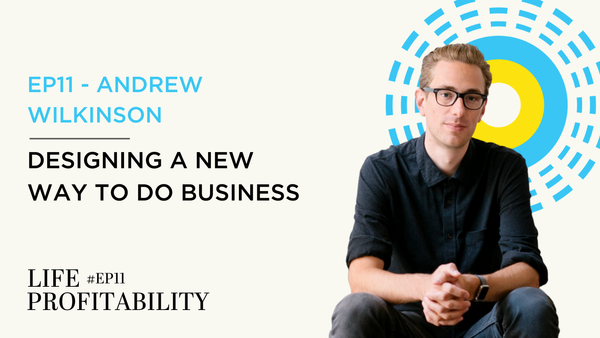Summary
Andrew Wilkinson is the founder of MetaLab Design and a cofounder of Tiny Capital, a company that starts, buys, and invests in internet businesses. Andrew has worked alongside prominent names such as Walmart, Slack, Dribbble, and Uber. In this episode, Adii and Andrew discuss Andrew’s evolution from designer to investor, how design fits into the work he does now, starting MetaLab out of necessity, and optimizing his life and career to be able to say “no.”
Origins in Design
Andrew credits his parents for his good taste. His father having worked as an architect and mother having been very invested in design in the home, his entire childhood he was surrounded by “good design” without even realizing it. He calls good taste a “superpower” that not everyone has.
“I don’t think design is something that you can learn that easily. I feel like design is taste, and it’s hard to develop taste.”
The Necessary Creation of MetaLab
After dropping out of school and moving back in with his parents, Andrew got into freelance design. In high school he’d been very into web design. And while he wanted to move to Silicon Valley, he was lacking the fiscal means to do so. It was then that he would create the MetaLab Design agency, “out of necessity.”
MetaLab would offer Andrew the appearance of a big design agency. So when he reached out to startups, they would see him as a more “legit” freelancer. It took time, but eventually Andrew won megalith clients like Walmart, while also working on the frontlines with startups just getting off the ground.
Changing, Evolving, and Delegating Roles
Today, while Andrew still uses design as a tool, often giving feedback to his team, he is not the person actually doing the “building.” Despite this fact, he is always thinking through a design lens.
At first, Andrew was fearful when making the move out of the day to day and hiring an executive team and delegating the work. He gives the analogy that he has gone from an artisan craftsman building furniture alone in his garage to a massive woodworking shop with locations all over the world and hundreds of people and machines working for him.
In the end, delegating worked greatly in Andrew’s favor. He found that while he is very passionate about starting a company, he often loses interest when it comes time to grow the company. By delegating, he could bring in a CEO who could be passionate about growing from those foundations.
The Best of Both Work Cultures
A night owl, Andrew has always had an unconventional life and work style. This is what brought him to decide to allow his entire team to work remotely. This format would offer his employees autonomy, freedom, and an ability to structure their days—which would prove foundational for the culture of all of the businesses he has started and acquired.
“I really disagree with the notion that you can either build a billion dollar business and you gotta blow your brains out and have an office in Silicon Valley and sleep on your desk—or you can have an enjoyable day to day life and just not meet your potential. And we are really here to counter that narrative.”
Life Profitability
People whose goal is to make a billion dollar business aren’t thinking about what they want their day to day life to be and how they can enjoy their life, Andrew says building a business should not be at the cost of a happy life. He would much rather be a small fish in a small pond than a big fish in a big pond, or worse, a small fish in a big pond fighting to be a big fish. Ultimately, his main goal is protecting himself, his family, and the people he cares about.
Andrew hopes to continue to exist outside of the “epicenter of dogmatism and opinion” of Silicon Valley and traditional Internet business as he protects the culture of his companies and continues to buy great businesses.
